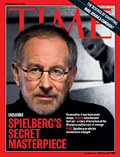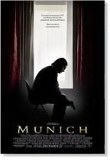|
 Time Interview: Spielberg's Prayer for Peace Time Interview: Spielberg's Prayer for PeaceJust after finishing his new movie about the aftermath of the massacre at the Munich Olympics, Steven Spielberg talked with Time movie critic Richard Schickel, who collaborated with him on the TV documentary Shooting War, about his reasons for taking on Munich, his anger at the International Olympic Committee and his modest plan for improving Arab-Israeli relations.
Time: Would it be fair to say that this movie is, in the end, about the human cost of a quagmire?
Yes. And also for me this movie is a prayer for peace. I always kept thinking about that as I was making it. Some-where inside all this intransigence there has to be a prayer for peace. Because the biggest enemy is not the Palestinians or the Israelis. The biggest enemy in the region is intransigence. Do you know Amos Oz's books? There's a wonderful quote we found, that sort of makes sense to me: "In the lives of individuals, and of peoples, too, the worst conflicts are often those that break out between those who are persecuted." They see in each other's faces a reflection of some larger oppressor. That may well be the case with the 100-year conflict between Arabs and Jews.
Do you think this film will do any good?
I've never, ever made a movie where I said I'm making this picture because the message can do some good for the world--even when I made Schindler's List. I was terrified that it was going to do the opposite of good. I thought perhaps it might bring shame to the memory of those who didn't survive the Holocaust--and even worse to those who did. I made the picture out of just pure wanting to get that story told. I thought it was important that at least my kids someday could see what happened, just to hear that story being told. I feel the same way about Munich. I don't think any movie or any book or any work of art can solve the stalemate in the Middle East today.
But it's certainly worth a try.
Everything's worth a try. I didn't make this movie to make money, and I don't know if I've made a commercial movie at all. But I certainly feel that if filmmakers have the courage to talk about these issues--whether they're fictional representations of real events or are pure fiction or pure documentaries--as long as we're willing to talk about the real tough, hard subjects unsparingly, I think it's a good thing to get out in the ether. It's not a bad thing. And there's a project I'm initiating next February that I think might also do some good.
What's that?
What I'm doing is buying 250 video cameras and players and dividing them up, giving 125 of them to Palestinian children, 125 to Israeli kids, so they can make movies about their own lives--not dramas, just little documentaries about who they are and what they believe in, who their parents are, where they go to school, what they had to eat, what movies they watch, what CDs they listen to--and then exchange the videos. That's the kind of thing that can be effective, I think, in simply making people understand that there aren't that many differences that divide Israelis from Palestinians--not as human beings, anyway.
In the same way, everyone in the movie is human. You feel for them all.
Right. I think the thing I'm very proud of is that [screenwriter] Tony Kushner and I and the actors did not demonize anyone in the film. We don't demonize our targets. They're individuals. They have families. Although what happened in Munich, I condemn. One of the reasons I wanted to tell this story is that every four years there's an Olympics somewhere in the world, and there has never been an adequate tribute paid to the Israeli athletes who were murdered in '72, and I wanted to tell this as a tribute to them. That was an important motivation for me, one of the earliest reasons I wanted to tell this story. I wanted this film to be in memory of them, because they seem to have been forgotten. The silence about them by the International Olympic Committee is getting louder for me every four years. There has to be an appropriate official acknowledgment of what happened.
It seems to me that even though you say, "I didn't make this movie to make money," obviously you do want as many people as possible to see the movie because of the issues that it raises.
The subject matter isn't the kind of subject matter that is going to outgross King Kong--not even on the last day of [Kong's] release. But one never knows in this business. I don't have a crystal ball, and I've never had one, even though I'm accused of having one secreted away somewhere. I don't. And I don't know. I'm lucky at this point in my career that I can make the movies I want to make without having a studio come in and second-guess me. I always say thank goodness for Jaws, because Jaws gave me final cut. I've had it now for 30 years, and because of that I only have myself to blame for anything that goes wrong.
People ask me what you're really like. The short answer I always give--and it's a truthful one--is that I don't know anyone who's better at keeping in touch with his inner child. On the other hand, you make an awful lot of movies, like Munich, that are far from childlike. Guess I'll have to come up with a new one-liner about you.
I don't know if you can, Richard. Maybe the child in all of us dies just when we need him the most. I cannot tell you how many people come over to me on the street and repeat almost verbatim the line the Martians say to Woody Allen in Stardust Memories: "You know, we like your earlier, funnier films."
They come up to you?
They'll say, "Why can't you get back to making E.T. or Raiders?" This is not from young people but from older people, who I guess grew up with the movies I made when I was a kid and they were kids too. So I'm bewitched by Woody Allen in the sense that I keep hearing this scene from Stardust Memories played out in my real life. It's very bedeviling.
So does that mean you're going to put away childish things from here on out?
Well, you never can tell. I keep looking around for things, but then when I get the opportunity, say, to direct Harry Potter, I say no. When I get the opportunity to do something like Spider-Man, I say no. The films that are offered me that have childlike souls, I tend to say, "I've done that." I don't know if that just means I've grown up for good or whether something's going to come along that's going to make me say, "O.K., whatever I said to you is full of hot air, and the child lives in all of us until we die."
You seem to have this pattern of doing two movies back-to-back and then stepping back. Do you like doing it that way?
I hate doing it that way. When I don't have a movie, I don't take a job just for the sake of working. I just sit it out until I find something I'm passionate about. If I find something light, I'll make it. Like Terminal. It wasn't a film that I'll be remembered for, but it's a film I'll remember for the rest of my life, a sweet short story that gave me a chance to work with Tom Hanks--and people think I'm crazy for saying this--giving what I think was his best performance. Some people have said, "Why did you make that little movie when you could have been doing something important?" And I said, "Well, at the time it was important." And if I find something dark and historical--like this Doris Kearns Goodwin book [Team of Rivals, about Abraham Lincoln] I'm working on now--I'll do that. It's just how things work out. It's all about timing.
By Richard Schickel, Time Magazine
Dark Horizons Article
|
 |